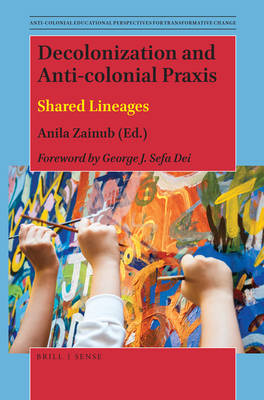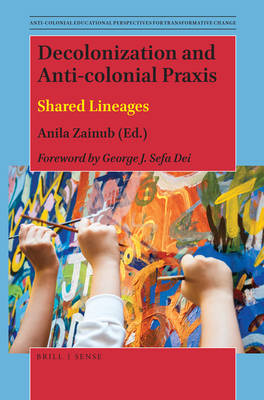
- Afhalen na 1 uur in een winkel met voorraad
- Gratis thuislevering in België vanaf € 30
- Ruim aanbod met 7 miljoen producten
- Afhalen na 1 uur in een winkel met voorraad
- Gratis thuislevering in België vanaf € 30
- Ruim aanbod met 7 miljoen producten
Zoeken
Decolonization and Anti-Colonial PRAXIS
Shared Lineages
€ 242,95
+ 485 punten
Omschrijving
Decolonization and Anti-colonial Praxis presents research on contemporary forms of decolonization and anti-colonialism in practice. It pertains to the ways in which individuals, groups, and communities engage with the logic of epistemic colonial power within areas of citizenship, migration, education, Indigeneity, language, land struggle, and social work. The contributions in this edited volume empirically document the conceptual and bodily engagement of racialized and violated individuals and communities as they use anti-colonial principles to disrupt criminalizing institutional discourses and policies within various global imperial contexts.
The terms 'Decolonization' and 'Anti-colonialism' are used in diverse and interdisciplinary academic perspectives. They are researched upon and elaborated in necessary ways in the theoretical literature, however, it is rare to see these principles employed in applied forms. Decolonization and Anti-colonial Praxis provides a much needed contemporary and representative reclamation of these concepts from the standpoint of racialized communities. It explores the frameworks and methods rooted in their indigeneity, cultural history and memories to imagine a new future. The research findings and methodological tools presented in this book will be of interdisciplinary interest to teachers, graduate students and researchers.
Contributors are: Harriet Akanmori, Ayah Al Oballi, Sevgi Arslan, Jacqueline Benn-John, Lucy El-Sherif, Danielle Freitas, Pablo Isla Monsalve, Dionisio Nyaga, Hoda Samater, Rose Ann Torres, Umar Umangay, and Anila Zainub.
The terms 'Decolonization' and 'Anti-colonialism' are used in diverse and interdisciplinary academic perspectives. They are researched upon and elaborated in necessary ways in the theoretical literature, however, it is rare to see these principles employed in applied forms. Decolonization and Anti-colonial Praxis provides a much needed contemporary and representative reclamation of these concepts from the standpoint of racialized communities. It explores the frameworks and methods rooted in their indigeneity, cultural history and memories to imagine a new future. The research findings and methodological tools presented in this book will be of interdisciplinary interest to teachers, graduate students and researchers.
Contributors are: Harriet Akanmori, Ayah Al Oballi, Sevgi Arslan, Jacqueline Benn-John, Lucy El-Sherif, Danielle Freitas, Pablo Isla Monsalve, Dionisio Nyaga, Hoda Samater, Rose Ann Torres, Umar Umangay, and Anila Zainub.
Specificaties
Betrokkenen
- Uitgeverij:
Inhoud
- Aantal bladzijden:
- 178
- Taal:
- Engels
- Reeks:
- Reeksnummer:
- nr. 8
Eigenschappen
- Productcode (EAN):
- 9789004388703
- Verschijningsdatum:
- 13/06/2019
- Uitvoering:
- Hardcover
- Formaat:
- Genaaid
- Afmetingen:
- 160 mm x 239 mm
- Gewicht:
- 158 g

Alleen bij Standaard Boekhandel
+ 485 punten op je klantenkaart van Standaard Boekhandel
Beoordelingen
We publiceren alleen reviews die voldoen aan de voorwaarden voor reviews. Bekijk onze voorwaarden voor reviews.










